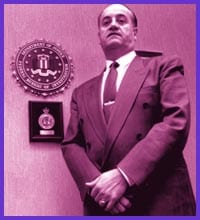Fledgling efforts at establishing a liaison committee between police and the gay community have already sprung a leak.
The June 13 Committee, set up following arrests and a series of raids at The Bijou porn theatre, has withdrawn from the process.
“The process is flawed as it is constituted,” says Chris Borst of June 13.
“It’s exclusionary,” Borst says. “To be fully democratic it should draw in as broad a range as possible, be very public and not be driven by agencies.”
Committee members also cite recent comments made by Julian Fantino, the new Toronto police chief sworn in Mar 6, as indications that Fantino is not willing to work with the city’s minority groups.
Liaison committee organizers are staff at the Victim Assistance Program of the 519 Church Street Community Centre. They drew attendance by inviting about 20 community groups and agencies to a meeting with Fantino, held at the end of January. A second meeting was scheduled for Wed, Mar 8 (after Xtra went to press), to which representatives from some 200 groups were invited.
It’s at this meeting that the June 13 Committee will formally announce its reasons for abandoning the process.
A press release states: “The invitations issued to the meeting scheduled for Mar 8, while more broadly distributed, are still limited to community groups and agencies. In our view, this is insufficient to ensure the democratic integrity of the process, which should be open to all members of the Toronto queer community.”
June 13 isn’t the only queer group feeling dubious about the efforts to date.
“I can understand why they would want to withdraw over concerns that they would be part of a committee that would not have any effect,” says John Maxwell, director of community development for the AIDS Committee Of Toronto.
Maxwell, who represented ACT at the Mar 8 meeting, says he hopes there will be discussion as to whether the community wants to pursue developing a liaison committee with the police.
“As an agency, we haven’t decided whether we want to go forward. We don’t know what effect it can have,” Maxwell says.
Besides the squirmy issue of whether homos want to be seen to be getting into bed with the cops, Maxwell agrees with the June 13 Committee that recent comments made by Fantino have spiked anxiety levels and should give everybody serious cause for concern.
Fantino, in an interview with the National Post, said he thinks Canada should handle drug dealers the same way Singapore does, where offences from possession to trafficking can net offenders five years to life in prison, or from caning with a rattan stick to the death sentence.
“I would” support something like this. “These people are merchants of misery and death.”
The new chief also told delegates at an Ontario Tory convention in Hamilton (on Feb 12 and 13) that he believes Canada’s immigration laws are too lax and they allow for criminals to enter the country and cross the border into the United States.
Borst says the June 13 Committee is suspicious of Fantino’s motives because of Project Guardian, the undercover operation headed by Fantino when he was chief of the London police that targeted gay men allegedly running a child pornography ring.
According to Borst, Fantino refused to speak about Project Guardian at the first meeting in January.
However, Fantino did break his silence on Project Guardian during a phone-in show on City’s Talk TV. Fantino told reporter Pam Seattle that the accusations made by the gay community about Project Guardian amounted to “character assassination.”
Certainly, nothing would irk more than Fantino being able to score politically from a liaison committee, if no meaningful progress is made.
“At this stage, we see any kind of liaison process will only advance Fantino’s cause. He will get to look like a good guy,” Borst says.
Despite the fears, Howard Shulman of the Victim’s Assistance Program at The 519 says he hopes the agencies and groups at Wednesday’s meeting will start strategizing about a model for a police liaison committee that could be proposed.
Shulman says he expects discussion on whether this is the route the community wants to follow.
“At this point it seems it will go forward,” Shulman says.

 Why you can trust Xtra
Why you can trust Xtra


